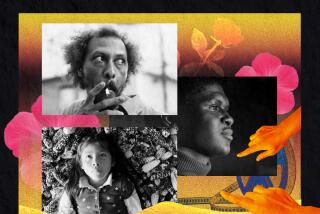Review: âLes MisĂ©rablesâ is compelling and terrifyingly real
âLes MisĂ©rablesâ is not merely named after Victor Hugoâs celebrated novel, it shares its setting and succeeds splendidly in a mutual goal.
Directed and co-written by Ladj Ly, who was born, raised and still lives in Montfermeil, the perennially impoverished Parisian banlieue or suburb where Hugo set part of his story, âLes MisĂ©rablesâ has exploded on the French film scene.
Snapped up by Amazon almost immediately after its Cannes debut, it won the festivalâs jury prize and became Franceâs Oscar submission, with Ly becoming the first black French filmmaker so honored.
The reason for all this excitement is that, like the original Hugo novel, âLes MisĂ©rablesâ is both culturally relevant and dramatically compelling, finding a way to balance artistic metaphor, hugely involving storytelling and criticism of a system that allows crushing poverty to survive and prosper.
Though this energetic, terrifyingly real film is Lyâs debut as a feature director, he has been making movies, mostly documentaries, for decades. In fact, a short film on the same subject was nominated for a CĂ©sar a couple of years ago.
Lyâs considerable skill aside, what makes âLes MisĂ©rablesâ such an immersive experience is the crackling sense of authenticity that is the filmâs birthright.
Working with co-writers Giordano Gederlini and Alexis Manenti and cinematographer Julien Poupard, Ly proves to be a superb orchestrator of time and space, taking us through two days in and around Montfermeilâs Bosquets housing project, where the sense that things can get out of hand in a heartbeat is ever-present.
In an inspired bit of counterpoint, Ly has chosen to open âLes MisĂ©rablesâ on an unexpected happy note. Inspired by 1998âs World Cup, he shows neighborhood kids headed into central Paris, draping themselves in the French flag and celebrating with people of all colors as their country wins. Itâs a note of beautiful unity we never get close to again.
Operating in a much more confrontational manner are the three men of the local policeâs Anti-Crime Squad, who drive around in a gray Peugeot focusing on keeping a lid on things.
Brand new to the squad is Stephane (Damien Bonnard), who has transferred in from another part of France and has been paired with veterans Chris (Alexis Manenti) and Gwana (Djebril Zonga).
While Gwana is mostly cool and laid back, the volcanic Chris, who glories in his Pink Pig nickname, is anything but.
A confrontational bigot with a hair-trigger temper, he immediately starts to needle Stephane, nicknaming him âGreaserâ because of his hairstyle. When the new guy questions his lack of politeness, Chris snaps, âwhy donât you work as a butler in a palace.â
As Stephane is introduced at the police station, we get to meet the areaâs sardonic commander (a tartly unexpected Jeanne Balibar), who emphasizes the importance of group unity.
Itâs at the police station that we get our first glimpse of Issa (Issa Perica), a boy whose father is furious at him for being a perpetual troublemaker, a characterization that turns out to be all too true.
We get to observe other neighborhood kids too, running around in packs looking to amuse themselves. Key among these is Buzz (Al-Hassan Ly), a quiet type with enormous glasses whose fixation on filming everything in the neighborhood from his drone, especially girls, becomes central to the plot.
As the police motor around and the veterans show the new guy the lay of the land, we get a sense of how balkanized this area is, how many power centers there are and how little they care for one another.
The police have no use for the areaâs mayor (Steve Tientcheu), whom Chris needles as âour own Obama,â but because he has his own power base they need each other. The same goes for the local crime boss and for Salah (Almamy KanoutĂ©), an imposing individual who is associated with the powerful Muslim Brotherhood.
âLes MisĂ©rablesââ plot kicks in when members of a just-arrived small traveling circus drive around the neighborhood screaming imprecations like, âwhoever stole Jimmy, weâre going to eat your brains.â
Jimmy turns out to be a baby lion cub, and as the police attempt to get him back, something unforeseen and terrible happens and it is the nature of the neighborhood that each faction is desperate not to do the right thing but to find a way to use it to their advantage.
Ly says everything in the film was inspired by real events and, except for the three leads and Balibar, has cast it with non-professionals from the area.
Equally impressive, and this cannot have been easy, he is sympathetic to all sides, even the police, honoring the complexity of the situation by refusing to offer easy solutions to intractable problems.
More than anything, especially with its unnerving ending, âLes MisĂ©rablesâ wants us to think. What have we done as a society, what do we continue to do, what can be done to change things before it is too late.
'Les Misérables'
Rated: R, for language throughout, some disturbing/violent content, and sexual references
Running time: 1 hour, 44 minutes
Playing: Starts Nov. 29, Arena Cinelounge, Hollywood; in limited release Jan. 10
More to Read
Only good movies
Get the Indie Focus newsletter, Mark Olsen's weekly guide to the world of cinema.
You may occasionally receive promotional content from the Los Angeles Times.











